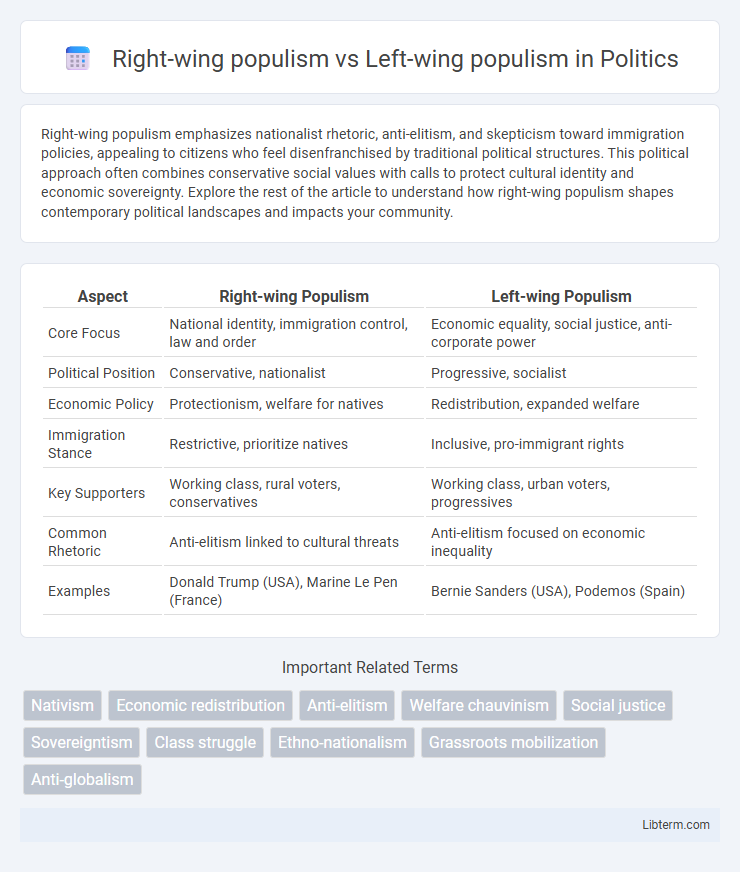Right-wing populism emphasizes nationalist rhetoric, anti-elitism, and skepticism toward immigration policies, appealing to citizens who feel disenfranchised by traditional political structures. This political approach often combines conservative social values with calls to protect cultural identity and economic sovereignty. Explore the rest of the article to understand how right-wing populism shapes contemporary political landscapes and impacts your community.
Table of Comparison
| Aspect | Right-wing Populism | Left-wing Populism |
|---|---|---|
| Core Focus | National identity, immigration control, law and order | Economic equality, social justice, anti-corporate power |
| Political Position | Conservative, nationalist | Progressive, socialist |
| Economic Policy | Protectionism, welfare for natives | Redistribution, expanded welfare |
| Immigration Stance | Restrictive, prioritize natives | Inclusive, pro-immigrant rights |
| Key Supporters | Working class, rural voters, conservatives | Working class, urban voters, progressives |
| Common Rhetoric | Anti-elitism linked to cultural threats | Anti-elitism focused on economic inequality |
| Examples | Donald Trump (USA), Marine Le Pen (France) | Bernie Sanders (USA), Podemos (Spain) |
Defining Right-Wing Populism
Right-wing populism centers on nationalism, anti-immigration policies, and a strong emphasis on traditional social values, often positioning itself against perceived elite or establishment control. It typically advocates for stricter border controls, protectionist economic measures, and preservation of cultural identity. This political ideology distinguishes itself from left-wing populism by prioritizing free-market capitalism and conservative social policies, contrasting with the latter's focus on economic redistribution and social equality.
Understanding Left-Wing Populism
Left-wing populism emphasizes social equality, economic justice, and the redistribution of wealth to reduce disparities between the elite and the working class. It often advocates for stronger welfare systems, increased public spending on healthcare and education, and the regulation of corporations to protect workers' rights. Understanding left-wing populism requires recognizing its focus on collective empowerment and challenging established economic and political power structures.
Historical Roots of Populist Movements
Right-wing populism traces its historical roots to nationalist and conservative movements of the late 19th and early 20th centuries, emphasizing cultural identity, anti-elitism, and skepticism toward immigration and globalization. Left-wing populism emerged from labor movements and socialist ideologies, focusing on economic inequality, workers' rights, and opposition to corporate power, with foundational moments linked to events like the early 20th-century labor strikes and the New Deal era. Both forms of populism arise as responses to perceived socioeconomic injustices but differ fundamentally in their core values and target constituencies based on these historical trajectories.
Core Ideologies and Beliefs
Right-wing populism emphasizes nationalism, anti-immigration stances, and a strong state enforcing traditional cultural values, often advocating for economic protectionism and skepticism towards globalism. Left-wing populism centers on social justice, economic equality, and redistribution of wealth, promoting policies like expanded welfare, workers' rights, and challenging corporate power and neoliberal economic structures. Both forms mobilize a critique of the elite but diverge in their vision of the "people" and the solutions to societal issues, with right-wing populism focusing on cultural identity and left-wing populism on economic reform.
Key Political Leaders and Parties
Right-wing populism is typified by leaders such as Donald Trump in the United States and Marine Le Pen of France's National Rally, emphasizing nationalism, anti-immigration policies, and skepticism of globalization. Left-wing populism is represented by figures like Bernie Sanders in the U.S. and Podemos in Spain, focusing on economic inequality, social justice, and expanding welfare programs. Key parties include Germany's Alternative for Germany (AfD) on the right and Greece's Syriza on the left, reflecting differing priorities in addressing public discontent through nationalist versus redistributive agendas.
Populist Rhetoric and Communication Styles
Right-wing populism often employs nationalist rhetoric emphasizing anti-elitism, immigration control, and protection of traditional values, using direct, emotive language to appeal to fears and identity politics. Left-wing populism focuses on economic inequality, social justice, and anti-corporate sentiments, utilizing inclusive, solidarity-driven communication that highlights systemic injustices and advocates for redistribution. Both styles harness social media platforms to mobilize grassroots supporters, but right-wing populists tend to use more confrontational messaging, while left-wing populists emphasize coalition-building and collective action.
Economic Policies and Social Concerns
Right-wing populism often emphasizes free-market capitalism, reducing government intervention in the economy, and prioritizes national sovereignty in trade policies, while promoting conservative social values such as immigration restriction and cultural nationalism. Left-wing populism advocates for wealth redistribution through progressive taxation, expanded social welfare programs, and stronger labor rights, coupled with inclusive social policies emphasizing equality, anti-discrimination, and environmental justice. Both variants use economic grievances and social concerns to mobilize support, but they diverge sharply on globalization, social justice, and the role of the state in economic regulation.
Attitudes Toward Immigration and National Identity
Right-wing populism typically emphasizes restrictive immigration policies and prioritizes national identity by advocating for cultural homogeneity and sovereignty protection. Left-wing populism often supports more inclusive immigration stances, framing migration as a human rights issue while advocating for social justice and multiculturalism within the national identity. These contrasting attitudes reflect deeper ideological divides about the role of immigration in shaping societal cohesion and state policies.
Impact on Democracy and Political Institutions
Right-wing populism often challenges democratic norms by promoting nationalist rhetoric and undermining pluralism, leading to increased polarization and weakening institutional checks and balances. Left-wing populism tends to emphasize economic inequality and social justice, advocating for expanded welfare policies and greater government intervention, which can reshape democratic priorities but also provoke institutional resistance. Both variants significantly impact political institutions by either consolidating power in executive branches or prompting institutional reforms, thereby altering the dynamics of democratic governance.
Global Trends and Future Prospects
Right-wing populism, characterized by nationalist rhetoric and anti-immigration policies, has surged globally in regions such as Europe, the Americas, and Asia, fueled by economic anxieties and cultural backlash. Left-wing populism, emphasizing wealth redistribution and social justice, gains traction in Latin America and parts of Europe, appealing to disenfranchised working classes and youth movements. Future prospects indicate a potential intensification of ideological polarization, with populist movements adapting to digital platforms and evolving socio-economic challenges worldwide.
Right-wing populism Infographic

 libterm.com
libterm.com